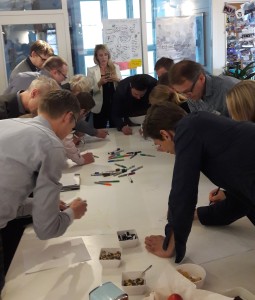OK, technically speaking, it was called a networking day. But that wouldn’t do justice to the content here.
The main thing we got out of the ACPN Agile contracting conference was the three different perspectives from lawyers, customers and providers. That gave us a unique insight into the challenges and questions from each party.
Some cool facts:
- Founders of both the Danish Agile contract (K03) and the Swedish Agile contract attended the conference.
- Agile contracts were used in large projects (up to €120M) by customers in Finland and Denmark.
- Customers who have used Agile contracting in big projects have been really successful. We saw impressive results in one case: Danish Business Authority (a €60M program) delivered their projects on time using Agile contracts and at the same time managed to reduce service calls by 40%, case handling time by 69% and improve one time pass by a whopping 92%!
Insights and reflections from the conference:
- Agile contracts are being used in large public sector programs in both Denmark and Finland. The Finnish Agile contract (€1.2 Billion) was a direct order from the Finnish Ministry of Finance and a precondition to get the funding. You can’t help but wonder why Sweden is trailing.
- A driving force behind the adoption of Agile contracts in Finland is the tight budget conditions.
- Time and materials contracts are not recommended for parties who work together for the first time. A target price model works better because it gives both parties the incentive to deliver on time.
- Code camps where you develop a small part of a software solution together in 1 day, is the method of choice to learn about the provider’s maturity and skill level. It forces both parties to look under the hood which reduces risk.
- During code camps and provider evaluation, the providers are generally paid time and materials for their participation. This is a fair trade between the customer who wants to find the best skill for the job, and the providers, who provide the options.
- Legal issues are not a constraint to Agile contracting but getting the wrong lawyer as advisor is. The best choice for mid- to large-size IT projects is to create a small procurement team consisting of an Agile specialist, a software architect, a lawyer with Agile contracting experience and 1-2 customer representatives. This gives you the benefit of having software, legal and business /user experience and perspectives.
If you want to read more about the conference and including a short video summary – check out:
- http://agilakontrakt.se/insikter-fran-nordens-forsta-konferens-om-agila-kontrakt
(note: text in Swedish).
The conference was organized by Crisp & Nordic River (Sweden), Best Brains (Denmark) and Codento (Finland).




